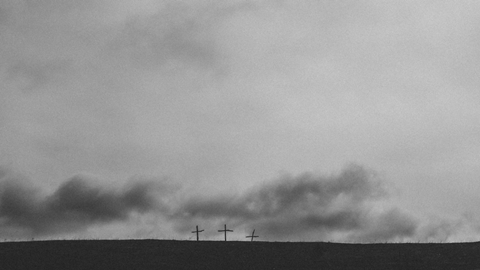Professor John Swinton, a former psychiatric nurse-turned practical theologian at Aberdeen University, reflects on the significance of Good Friday and Holy Saturday
Good Friday
What happened on Good Friday was the crucifixion of Jesus. And I guess we call it good because the source of our redemption comes through the brokenness of Jesus on the cross. So clearly, that’s a good thing to happen. But actually, when you read the Gospel narrative of what goes on there, it’s far from good in that sense - the horrors, the brokenness, the things he went through there.
Good Friday is there because it reminds us that Jesus’ sacrifice opens up that space that enables us to find eternal life with God, and to find redemption and to find the forgiveness of sins. So there is lots of good, even in the midst of the horror of that Friday.
Read more:
How Holy Week brings hope
How do we know God is real?
The bedrock facts of the resurrection
Is there historical evidence for the bodily resurrection of Jesus?
There’s beauty in the cross, but the beauty in the cross comes from the emptiness of the cross. So, the cross symbolises that horrible act that occurs on Good Friday where Jesus’ broken body is battered, stabbed and all of these things. But then it’s taken off the cross and the cross is empty. And then you have the rest of the story that takes us into the resurrection.
The cross itself reminds us of what Jesus has done for us, and pushes us into the future as to what he continues to do for us. So we remember, but we remember with a view to allowing that memory to transform the future. On one level the cross is quite gruesome in that sense, but that’s kind of the point.
Holy Saturday
It would be very easy to make the resurrection a fantasy or an escape - that, somehow, we live on that side of the resurrection, rather than on the Holy Saturday side. Holy Saturday reminds us that suffering continues. That there is a dark space many of us, all of us, reside in. And many of us reside there in pretty unpleasant ways.
What, in my opinion, Holy Saturday does is it holds us back. It holds us back from celebrating before there’s something to celebrate. There’s obviously plenty to celebrate in the resurrection. But it holds us back and reminds us that we’re not there yet. It prevents us from developing a theology of glory that just glosses over suffering and moves straight to the resurrection.
Get access to exclusive bonus content & updates: register & sign up to the Premier Unbelievable? newsletter!
Holy Saturday reminds us that some people are here and we need to sit with them. If you glance across the world, many people are living in Holy Saturday, in continued suffering. We need to be wary of just constantly moving across to the resurrection without taking seriously the space that many of us reside in just now.
Martin Luther talks about a theology of glory and a theology of the cross. We move to theology of glory - instead of looking at the cross, we look beyond the cross towards that imagined fantasy life where there’s no suffering. Holy Saturday draws our attention to suffering just now, but at the same time, enables us to look hopefully to the post-resurrection life, where there is no more suffering, no more tears and no more goodbyes.
This is an adaptation of Ruth Jackson’s Holy Week conversation with Professor John Swinton on Unapologetic. To hear more from John, check out this episode.























